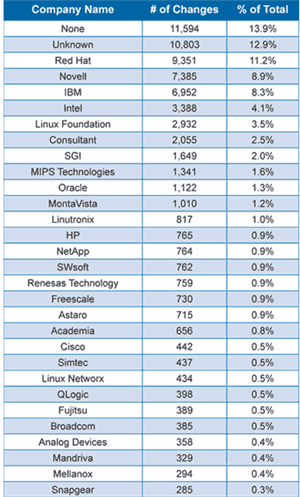The Linux Census: No one entity owns the kernel

The Linux Foundation on Tuesday released a report on Linux kernel development that is essentially a census of the open source operation. While much has been made about Novell's doubling of contributions to the Linux kernel, the two biggest categories of contributors aren't sponsored by any one company.

Also see: Novell insists it’s winning the Linux wars
The usual suspects--Red Hat, Novell and IBM--round out the top five in percentage terms, with 11.2 percent, 8.9 percent and 8.3 percent, respectively. Novell's big jump indicates that it has some momentum with developers. The top 10 contributors account for 70 percent of all kernel development--most of these folks are paid.Among the key takeaways:
- A new Linux kernel is released every 2.7 months on average.
- Every Linux kernel is being developed by nearly 1,000 developers.
- The number of active kernel developers has tripled since 2005.
- Roughly 70 percent and 95 percent are being paid for their work.
- "From the 2.6.11 to the 2.6.24 kernel release (a total of 1140 days), there were, on average, 2.83 patches applied to the kernel tree per hour. And that is only the patches that were accepted. The ability to sustain this rate of change for years is unprecedented in any previous public software project."
- 1,057 developers worked on Linux kernel 2.6.24, up from 483 for 2.6.11.